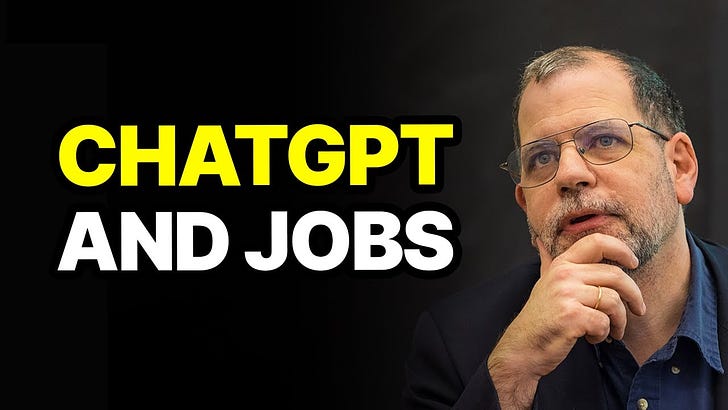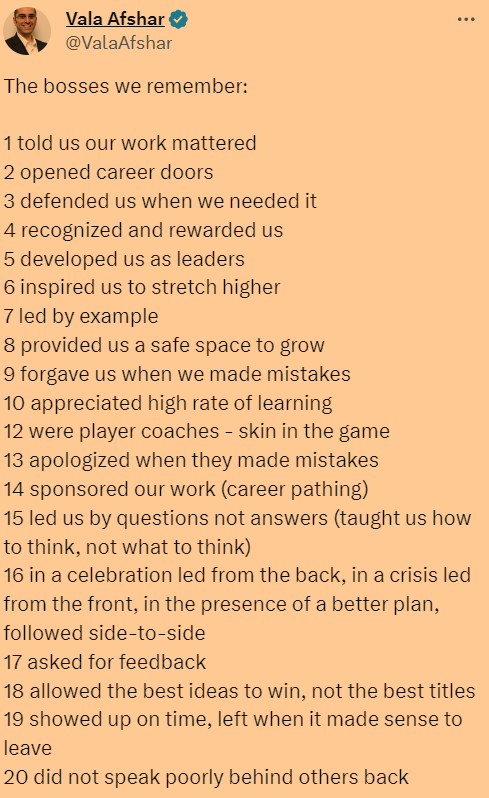🔥Welcome to Volume #00112!🔥
I’m Christian Champ. This is ☯️The Middle Way Newsletter ☯️. It is a place where I write, explore, share, and invite you along for the journey.
If you enjoy the newsletter, please share it with your friends.
🔋How We Can Use the Power of Themes to Supercharge Our Year🔋
Our best year ever that is always the goal.
How do we make 2024 the year we want and the year we need?
My best years coincide with creating a theme and living it with my actions.
Themes allow us to align our values and vision with what we spend our time doing.
They represent what you want out of the upcoming year; if we honor it, we focus our efforts and end up supercharging our outcomes.
When pondering my theme for this year, I kept envisioning going deeper.
I threw a lot of balls in the air the past couple of years, and leveling up and honing my skills takes me to that depth.
I see myself sharpening my sword.
This insight led to my theme for 2024, Sharpening the Sword.
I am taking the time to prepare it and get the blade ready. The sword represents my activities, and the sharpening part is me increasing my skills. Each brushing of the blade unlocks skills and affordances. The potential outcomes of my efforts grow the sharper the blade.
Nothing beats a theme for a party to show us how to show up.
A black-tie, beach, or backyard wedding lets you know the event's vibe.
Just like setting the tone for the party we are throwing, we can set the tone for our year.
The theme is the one to three things we want our year to encompass.
The theme shows us where to focus our lens.
The theme directs our attention and energy.
The theme is what we reflect on to see how things are going or what we recall to get back on track.
Themes that Work
#1 Act as Forcing Function
The theme is what we always revert to. Are we living in unity with our theme? Do our actions support our theme?
My theme for 2017 was helping others. I focused on managing better, coaching, mentoring, and helping level people up. I wanted my team at work to be clicking on all cylinders and hitting new highs for their careers. I worked the reps of helping by pushing and prodding people to be their best selves.
Anytime I felt lost, I turned back to how I was helping. Reflecting on my year, I asked, how am I helping?
#2 Align and Create Meaning
We get to pick themes that fit into where we are in our journey and help us with our path.
What matters
In 2019, my theme was family. The birth of my second child happened in January, and making family the center of my focus set us up for success. I knew going in that the priority number was the family. Everything else can happen, but it needed to be in second place.
#3 Find the Way
When we name a theme, we see ways to accomplish our aims. We see ways to create the outcomes we want and need.
One year, my theme was celebrating. I knew I could do a better job of celebrating. What I realized with this theme was to celebrate others. I'm not interested in celebrating myself, but it is fantastic to celebrate others' success.
Celebrating helped to get me to care less about my career success. Not that I want to stop trying or getting things done, but seeing others succeed and playing a small role in their success became a new focus.
Other themes I used include writing, gratitude, creating, embracing fear, doing new things, increasing wisdom, being calm, learning with my kids, giving, dancing, and movement.
Whether we are "Sharpening the Sword" or helping others, each theme creates a unique path for us to walk.
The key for us is to embrace our theme.
Each of my themes changed me and the people around me. They help shape my year and keep me on a path of growth, learning, and fulfillment. They helped make me more into the person I want to become.
As we start the year, what theme resonates for you? What phrases or words capture the essence of the path you wish to walk? The key to our themes is that they resonate within our core and the everyday actions we take.
Choosing a theme is a ritual for growth, better outcomes, and a successful life.
What is your theme for this year?
🧠Things to Think About🧠
Mike Fisher offers up an impactful read on Management
He writes to remind us what is noble and good about being a manager, helping team members manage complexity, which really means nurturing folks while working within the organizational goals and framework.
Effective management is about striking a balance between meeting organizational goals and ensuring employee well-being. A noble manager understands that their team's mental and physical health is paramount and that a happy team is a productive one. They advocate for their team's needs, provide support during challenging times, and celebrate their successes. This empathetic approach is what differentiates a good manager from a great one. It demonstrates a commitment to the holistic well-being of their team, which in turn fosters loyalty, trust, and a positive work environment.
When management goes well, we have a virtuous feedback loop for the organization and the individual in the team. When it doesn’t go well, as we all know from experience, it leads to frustration, talent drain, and negative feedback loops.
Being a good manager is a creative challenge and takes intention, effort, mistakes, corrections, and lots of practice.
Scott Alexander on Trauma and Ways to Avoid It
Scott dives into the things that create trauma and how politics is leading to trauma like effects and outcomes.
Very smart people lose basic reasoning abilities when the topic switches to politics. This isn’t just a truism, it’s been demonstrated in formal experiments. You can give people simple math/logic problems and confirm that they get the right answers. Then you can change the wording from “five apples and eight oranges”, to “five Democrats and eight assault weapons” and these same people will flounder and say idiotic things.
Politics over doing its part.
I think a lot of people feel persecuted and threatened by politics, a lot of people feel emotionally abused by politics, and a lot of people feel like they’ve had vicarious experiences of people they identify with being harmed by politics. This isn’t enough for a formal PTSD diagnosis - they probably didn’t watch the relevant TV news segments in a work-related context. But it might be enough to start doing some really unhealthy things to their brains.
The main theme is avoid the political media machine trying to hijack your emotions, no matter the side you are on.
This is a strong claim, but I make it in the context of the whole political ecosystem. Suppose that outrage addiction is, in fact, trauma addiction. That means the media ecosystem is a giant machine trying to traumatize as many people as possible in order to create repeat customers, ie trauma addicts. Combine that with the explicit, confessed desire on both sides to “trigger” the other as much as possible, and you have a lot of very clever people all trying to maximize one another’s trauma levels. On the external level, that looks like weaving as strong a narrative of threat and persecution as possible and trying to hit people in their psychological weak points. On the internal level, it means making sure they replace their normal ability to update with a series of triggers that make them replace reality with pre-packaged stories about how the other side is innately evil and everything they do is for specific threatening and evil reasons. Once you have a machine like that running, I’m not sure that identifying it will make things too much worse.
Walk and Talk Guide by Craig Mod and Kevin Kelly
Craig calls it a “walkable salon” where a group of people get together to enjoy a scenic and challenging walk while having enlightening discussions.
A moderator keeps the conversation on that day’s single topic to sharpen it and make it memorable.
To focus on conversations while walking, participants carry only day-packs, and eat locally prepared meals. The walks are not strenuous2 and to keep it even more inspiring, they take place in storied environments that are walker-friendly, such as footpaths in England, Japan, and Spain. By the end of the week, every person present has walked about 100 km3 and has had deep conversations with all the others.
Who do they look for for this adventure?
We have several attributes in mind that we look for in our co-walkers. They must be flexible travelers, which means they tend to not complain. We also look for good conversationalists since this is a week of talking. We also insist that they be able to join for the whole week since it takes that long to complete some conversations, precipitate friendships, and also — more pragmatically — it eases logistics to have everyone start and stop at the same moment.4 We discourage couples because if one has to cancel, both tend to cancel and that is disruptive to the group. Another reason to avoid inviting couples: We’ve found it more interesting to invite people who perhaps should know each other but don’t.
I added this idea to the list. If anyone is interested in participating, please reach out.
🎧Things to Listen, See, and Watch 🎧
Tyler notes we can use Chat GPT to
How to understand complex things and helping us do resesarch
Allow people to do things they normally couldn’t do in a domain or augment those abilities
LLMs act as therapists and analysts with very objective reactions
Mangement advice can get automated but companies still may need help implementing
My Snip Notes on the Founder’s Podcast on RedBull
1. Red Bull's marketing strategy involved fostering rumors about the drink's content instead of trying to suppress them, which proved to be effective in generating interest and intrigue.
2. Fostering rumors and controversy around a product can drive early sales and make the brand more memorable.
3. The formation of the European Union played a significant role in Red Bull's growth and success in multiple countries.
4. Red Bull initially gained a cult-like following by not countering rumors, leading to a surge in demand when it was approved for legal market presence.
5. Banning a product can result in free propaganda and increased demand, as seen in the case of the original Jordan shoe and Red Bull.
6. Red Bull's success is attributed to its cult-like brand following and its founder's personality shaping its culture.
7. Establishing deep loyalty and trust in business partnerships can have significant economic impact.
8. Strategic marketing strategies, such as differentiation through product design, can give a competitive edge.
9. The founder of Red Bull values physical fitness and engaging in activities like extreme sports.
10. Creating relationships with founders and investing in building trust can result in exponential returns and make a significant difference in one's life.
💣Words of Wisdom💣
"The fitter you are, the lower your risk of death. Again, there is no other intervention, drug or otherwise, that can rival this magnitude of benefit. Exercise is so effective against diseases of aging—the Horsemen—that it has often been compared to medicine." (Peter Attia, MD)
"Tyrants create a tense environment—one that is full of stress and anxiety. Liberators create an intense environment that requires concentration, diligence, and energy." (Liz Wiseman, Multipliers)
"Seeing Kobe in action was a subtle reminder of what my Phoenix Suns coach Monty Williams always says: "reps remove doubt."" (Chris Paul, Sixty-One)
"Productivity is often a distraction. Don’t aim for better ways to get through your tasks as quickly as possible. Instead aim for better tasks that you never want to stop doing." (Kevin Kelly, Excellent Advice for Living)
""Lots of people," as the poet and artist Austin Kleon puts it, "want to be the noun without doing the verb." To make something great, what's required is need. As in, I need to do this. I have to. I can't not." (Ryan Holiday, Perennial Seller)
"They come to their purpose by asking the question, “What do I want?” Often we coach them to ask the second, deeper question, “What do I really want?”" (The 15 Commitments of Conscious Leadership)
"We learn not only by thinking, we learn by doing. We set ourselves from the paralysis of analysis by taking action, which is something we knew as children and learn to stop doing as we grow up." (Herbert Lui, Creative Doing)
"Status is a zero-sum game. It’s a very old game. We’ve been playing it since monkey tribes. It’s hierarchical. Who’s number one? Who’s number two? Who’s number three?" (Eric Jorgenson, The Almanack of Naval Ravikant)
“Environments of uncertainty, ambiguity, and change require exploration, invention, experimentation, and adaptation, all of which require learning.” (Edward D. Hess, Learn or Die)
"There were many "aha" takeaways, but at the end of the day, the principal researcher, psychiatrist Dr. George Vaillant, summed up all the findings with a single sentence: “The only thing that really matters in life are your relationships to other.” (Rainn Wilson, Soul Boom)
"Start small, become consistent, and increase at a manageable pace. That's how you optimize for the finish line, rather than the starting line." (Tynan, Superhuman by Habit)
"The central question leaders are asking is: “How do we create the internal and external conditions that people need to perform their best?”" (Michael Gervais, The First Rule of Mastery)
"This is how willpower becomes a habit: by choosing a certain behavior ahead of time, and then following that routine when an inflection point arrives." (Charles Duhigg, The Power of Habit)
"To this day, Charlie continues to influence the firm’s attorneys, reminding them, “You don’t need to take the last dollar” and “Choose clients as you would friends.”" (Charles T. Munger, Poor Charlie’s Almanack)
"Effective marketers don’t begin with a solution, with the thing that makes them more clever than everyone else. Instead, we begin with a group we seek to serve, a problem they seek to solve, and a change they seek to make." (Seth Godin, This Is Marketing)
🙏Thanks for Reading🙏
What theme or themes do you want to have for this year?
Namaste,
Christian
Getting together with some of my favorite people I’ve worked with in NYC (and vests!).

















Share this post